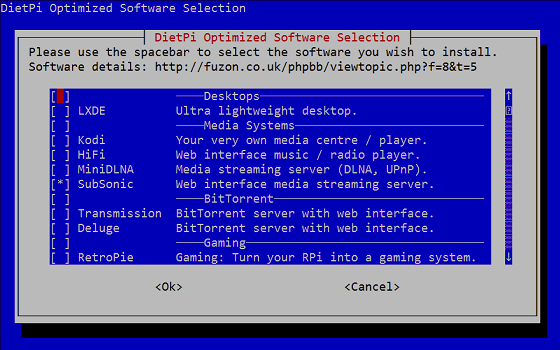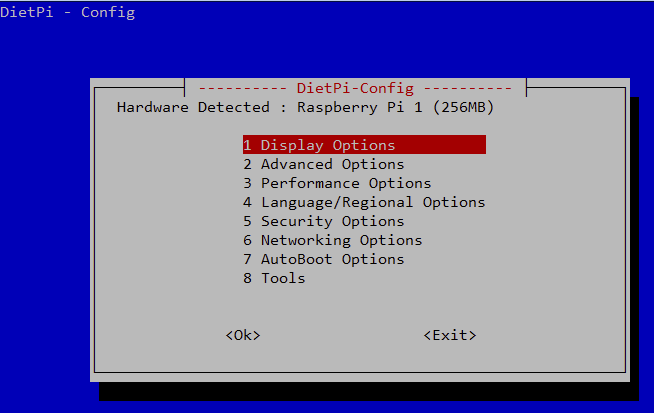 Raspberry Pi, Hardkernel ODROID, and Orange Pi are some of the most popular and cost effective development boards on the market today, and one British developer, going under Fourdee nickname, has released a lightweight distribution called DietPi working for all Rasbperry Pi boards, ODROID-C1(+), ODROID-XU3/XU4, and Orange Pi PC, with Orange Pi 2 and Orange Pi Plus support coming soon, as well as a VMWare virtual machine also available for evaluation.
Raspberry Pi, Hardkernel ODROID, and Orange Pi are some of the most popular and cost effective development boards on the market today, and one British developer, going under Fourdee nickname, has released a lightweight distribution called DietPi working for all Rasbperry Pi boards, ODROID-C1(+), ODROID-XU3/XU4, and Orange Pi PC, with Orange Pi 2 and Orange Pi Plus support coming soon, as well as a VMWare virtual machine also available for evaluation.
The compressed downloads are about 80 to 100MB depending on the target, the image that can be dump with dd or Win32DiskImager requires a 1GB or greater micro SD card as the image itself is about 500MB large, Internet access (Ethernet or Wifi), and optionally a USB Drive to allow installation on a USB drive for better performance, which of course does not apply if you have an eMMC module with your ODROID board.

Other notable scripts include DietPi-Backup, DietPi-Sync to duplicate directories, DietPi-Nice to assign priority levels to programs, and DietPi-Update System that automatically checks for updates, and install them from the network. You can also customize the level of logging with DietPi-Rramlog in order to optimize performance, and WiFi support is built-in in the image, and configurable with DietPi-Config.
 The operating system has its own website, but to get started quickly you’d better go to Download DietPi image | Getting started forum thread. You can also visit DietPi Github repository to check out the Bash scripts used in DietPi images. You may also be interested in seeing how it compares to Raspbian Lite.
The operating system has its own website, but to get started quickly you’d better go to Download DietPi image | Getting started forum thread. You can also visit DietPi Github repository to check out the Bash scripts used in DietPi images. You may also be interested in seeing how it compares to Raspbian Lite.
Via Peter Scargill

Jean-Luc started CNX Software in 2010 as a part-time endeavor, before quitting his job as a software engineering manager, and starting to write daily news, and reviews full time later in 2011.
Support CNX Software! Donate via cryptocurrencies, become a Patron on Patreon, or purchase goods on Amazon or Aliexpress





Unfortunately on the Orange Pis DietPi still uses the insane overvolted/overclocking settings that are the root cause for all the thermal issues the H3 SoC is blamed for: http://linux-sunxi.org/Orange_Pi_PC#Tips.2C_Tricks.2C_Caveats
@tkaiser
“With adjusted dvfs entries” what are those?
@zoobab
I developed two tables that work for my OPi PC (you’ll find them in the ‘free’ section on forum.armbian.com) but I would now go with the linux-sunxi official ones: http://www.orangepi.org/orangepibbsen/forum.php?mod=viewthread&tid=785
It’s not only about the dvfs table but also thermal settings (throttling vs. dropping CPU cores — all informations are referenced in the link above)
Apart from that DietPi really looks great 🙂
so this an alternative to OpenELEC ?
@Tony
I understand the distribution is headless, so there’s no program running by default, nor desktop environment, and you should simply be able to access the terminal on your TV or via ssg, and run the script to install whatever your need. If you install Kodi, then it will probably be similar to OpenELEC in some ways, but there are other program to install.
Could be used for banana pi too? Thanks.
I wish DietPi had scripts to switch between writable and read only system. Something like IPE R1 has (look at http://nutcom.hu/ipe-r1 and http://nutcom.hu/ipe-r1-updated-by-andreas-giemza). This would help to get a poweroff resistant system.
I like it, seems to work fine on OrangePi PC, wifi (rt5370) and ethernet works fine (in contrast to most of other linux distros where wifi firmware issues exist).
Also thermal management seems appropriate – idle runs below 50 C, under load it does not go above 70 and not stability issues.
@gicho
Close to 50°C when idle is insane. But fixing this is easy (explanation what went wrong also available): http://www.orangepi.org/orangepibbsen/forum.php?mod=viewthread&tid=785&fromuid=29411
They list several NanoPi boards as supported now.
Check their download section.
ok i tested out on orange pi one but its unusable at all lagging super bad this system overclocked super bad tested different power supplies otg n not working its just crap….
do they even tested on each single board pc?